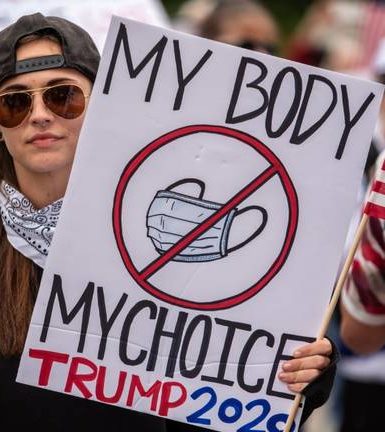Proponents of mask mandates cannot understand why others choose not to wear masks. What is the harm in following a directive from your government? Don’t you care about others?
Of course we do.
I for one am thrilled to see so many people who have supported ending human life at the earliest stage possible finally speaking up to defend it now.
I hope their passion for standing for life is contagious and many of the pro-abortionists become true pro-lifers.
But there’s good reason some of us choose not to wear masks — there is no conclusive evidence that they work.
In fact, at the beginning of the pandemic, the U.S. Surgeon General was pleading with Americans to stop buying masks.
“They are NOT effective in preventing general public from catching Coronavirus.”

That’s a pretty bold statement. I mean, he even went all caps with it. So, not only did he say they are not effective, he said they are NOT effective. That’s huge.
In 2016, it was written that the surgical mask is a bad fit for risk reduction. You can find that right here at the National Institutes of Health website.
“Western society expects too much of masks. In the public’s mind, masks are thought to prevent infection. From here, another problem arises: because surgical masks are thought to protect against infection in the community setting, people wearing masks for legitimate purposes form part of the larger misperception and act to reinforce it. Even this proper use of surgical masks is incorporated into a larger improper use in the era of pandemic fear, especially in Asia, where such fear is high. The widespread misconception about the use of surgical masks — that wearing a mask protects against the transmission of virus — is a problem of the kind theorized by German sociologist Ulrich Beck.”
During the 1919 influenza pandemic, masks were available and were dispensed, but had no impact on the epidemic curve. In 2010, the U.S. National Academy of Sciences declared that “face masks are not designed or certified to protect the wearer from exposure to respiratory hazards” in the community setting.
So, there’s that.
Now, here is where we differ. Those of us who don’t rely on masks are not going to demand others do not. It is totally your call. Read again — YOUR call.
And it should be our call for what we do. If you don’t want to be around people who don’t wear masks, stay home. Go to stores that require them. Don’t stand by someone without a mask on for 15 minutes. Give them 14 minutes, 59 seconds — but not a second longer.
Respect our decision, even if you disagree with it. We’ll do the same for you.












